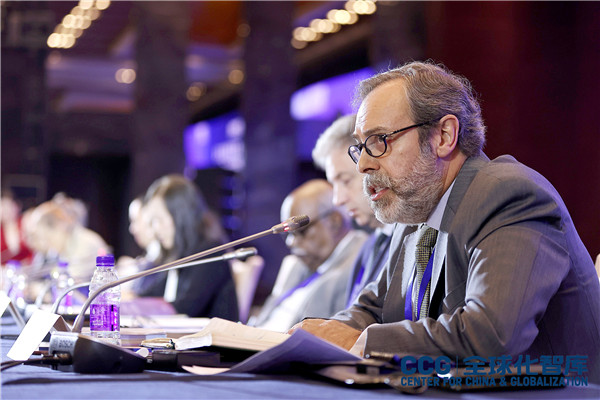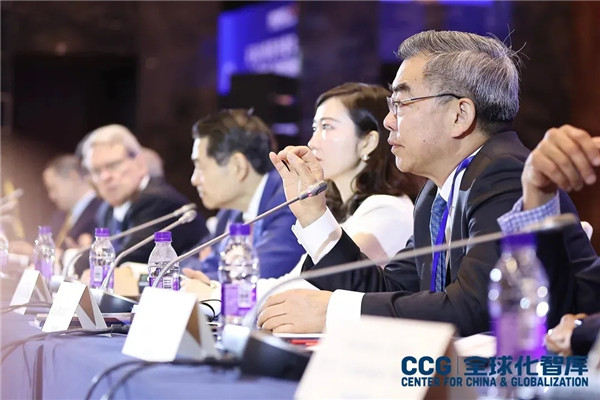The 5th Annual China and Globalization Forum
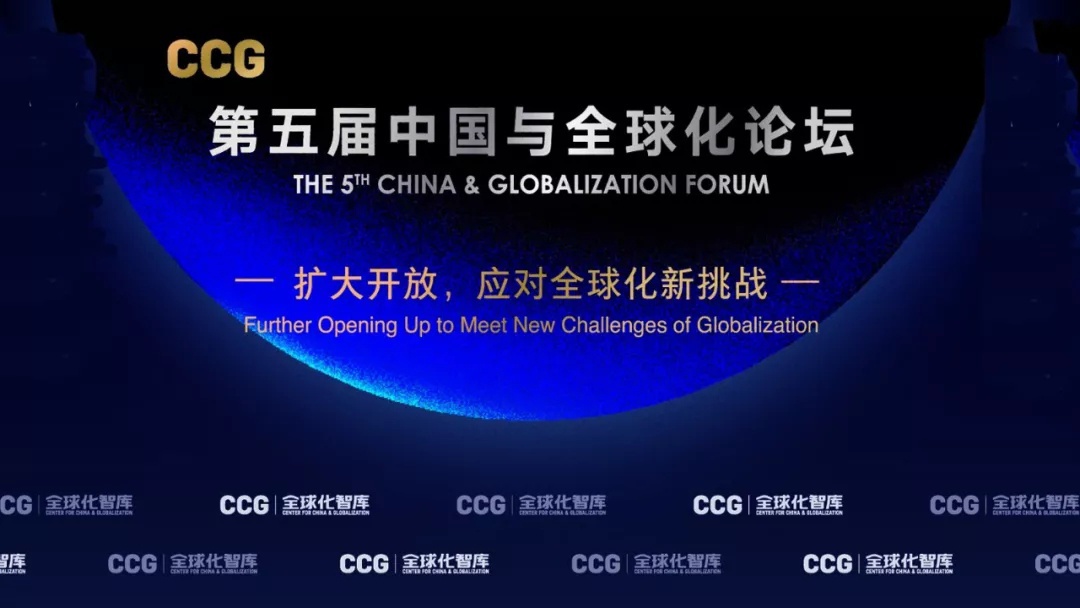
The Center for China and Globalization (CCG), PRC Ministry of Commerce China Association of International Economic Cooperation (CAIEC) and United Nations China (UN China), in partnership with the Academy of Contemporary China and the World Studies (ACCWS), jointly held the 5th Annual China and Globalization Forum on April 14th, 2019 at the China World International Conference Center, Beijing.
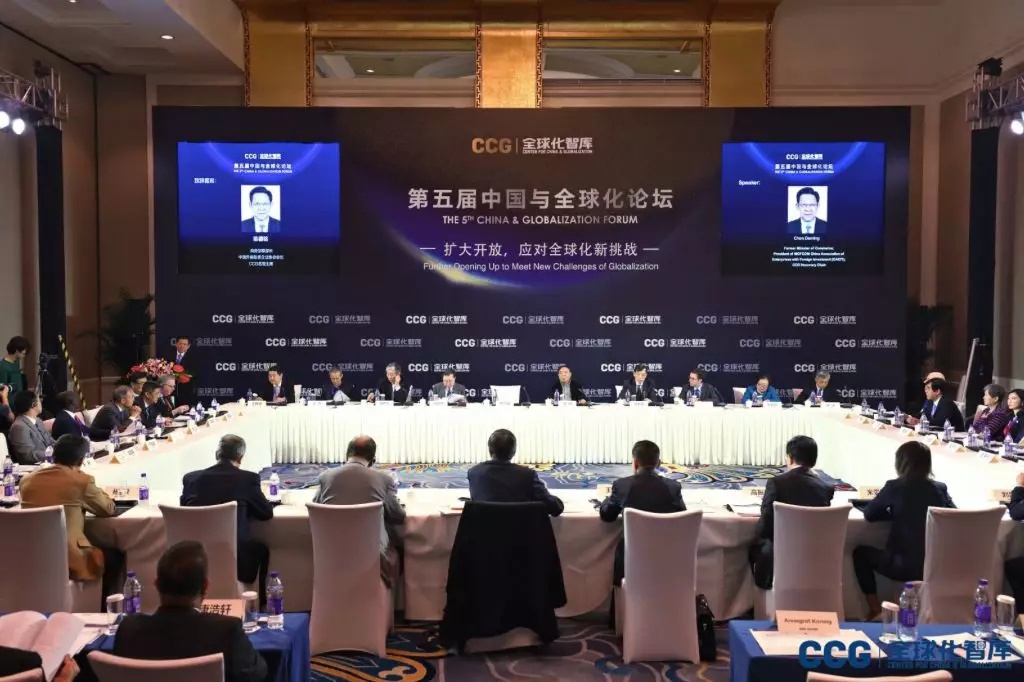
Themed “Further Opening Up to Meet New Challenges of Globalization”, the forum saw hundreds of CCG Council Members, scholars, experts and key figures in political and business circles share their in-depth views and hold discussions on the most pressing issues facing China and globalization today. Over 300 guests conducted exchanges on China’s Reform and Opening-Up process, responses to the new challenges of globalization, enhancing global governance, the development of the multilateral trade system, and related areas of global concern.

On the eve of the forum, CCG also held the annual meeting of its Chairmen and Senior Council Members. This meeting summarized CCG’s work throughout 2018, with discussions held and guidance provided for the further development of CCG as a world-renowned think tank.
Further Opening Up to Meet New Challenges of Globalization
2018 marked the 40th anniversary of China’s Reform and Opening-Up. Throughout this time, China has gradually accepted and come to promote the process of globalization, enabling the Chinese economy to achieve unprecedented development and giving the nation a voice on the world stage. Organizations and initiatives such as the “Belt and Road”, Asian Infrastructure Investment Bank (AIIB), BRICS and the Shanghai Cooperation Organization have all been instrumental in allowing emerging economies and developing countries to benefit from free trade and open markets and participate in the progression of globalization.
However, 2018 brought about many new challenges to the development of globalization. The intensification of anti-globalization sentiment and the spread of unilateralism and protectionism, coupled with rising global economic tensions and trade frictions, have posed severe challenges for the development of globalization, as well as the requirements of China’s globalization path.
The opening session of the forum was marked by speeches from Chen Deming, Former Minister of Commerce, President of MOFCOM China Association of Enterprises with Foreign Investment (CAEFI), CCG Honorary Chair; Cui Mingmo, President of MOFCOM China Association for International Economic Cooperation (CAFIEC); H.E. Nicholas Rosellini, UN Resident Coordinator in China; and Gao Anming, Vice President of China Foreign Languages Publishing Administration. Wang Huiyao, President of Center for China and Globalization (CCG), Vice President of China Association for International Economic Cooperation (CAFIEC), hosted the opening session where he announced the opening of the forum and set this year’s theme in context.
To address specific subjects in need of attention, the forum held five sessions and two dining events honing in on certain areas and aspects of China’s opening and globalization. These events gathered top officials, Chinese and international political representatives, leading experts, scholars and key figures in the business community with expertise and knowledge on these topics to share their perspectives and guide debate.
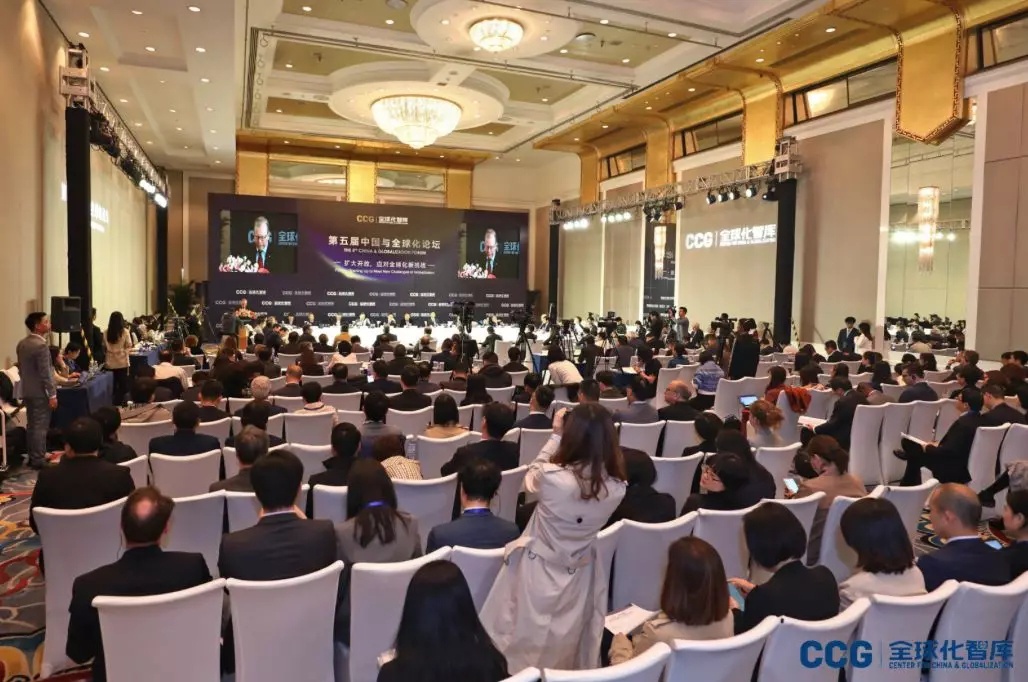
The topics of the forum’s sessions proceeded as follows:
Main Session: Future Prospects of Opening-up and Globalization
Ambassadorial Roundtable: New Paths for International Cooperation Under the Belt and Road Initiative and Beyond
Luncheon Session: Technology and Global Governance: Creating a Shared Future or More Fractured World?
Sino US Think Tank Expert Roundtable: Escaping Thucydides’ Trap – China, the United States, and the Trade Conflict Beyond
China Inbound Roundtable: Foreign Investment Law and New Prospects of FDI in China
China Outbound Roundtable: Chinese Outbound Investment in the Changing Context
Experts’ Evening Session: The Challenges of Global Governance and the Future of Multilateralism
The opening session of the forum was marked by speeches from Chen Deming, Former Minister of Commerce, President of MOFCOM China Association of Enterprises with Foreign Investment (CAEFI), CCG Honorary Chair; Cui Mingmo, President of MOFCOM China Association for International Economic Cooperation (CAFIEC); H.E. Nicholas Rosellini, UN Resident Coordinator in China; and Gao Anming, Vice President of China Foreign Languages Publishing Administration. Wang Huiyao, President of Center for China and Globalization (CCG), Vice President of China Association for International Economic Cooperation (CAFIEC), hosted the opening session where he announced the opening of the forum and set this year’s theme in context.
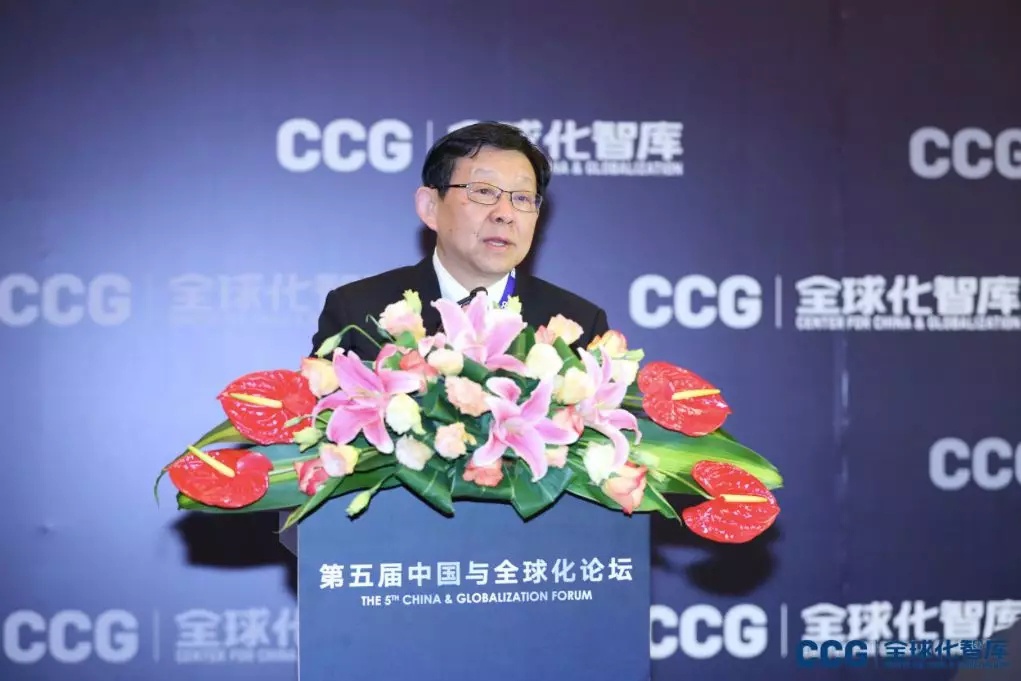
In his speech, Chen Deming, former Minister of Commerce, President of MOFCOM China Association of Enterprises with Foreign Investment (CAEFI), CCG Honorary Chair, noted the increasingly important role think tanks play in facilitating and progressing international exchanges. He expressed his hope for CCG to continue to nurture and build meaningful relationships and have in-depth exchanges with international think tanks, especially those in the U.S. and Europe, and provide suggestions, direction and objectives for China’s further opening-up and development. Emphasizing the need for the deepening of China’s reforms, the former Minister of Commerce reiterated the importance of keeping pace with the times, stating the need to revise and improve the rules of multilateralism and the building of a new form of major power relations.
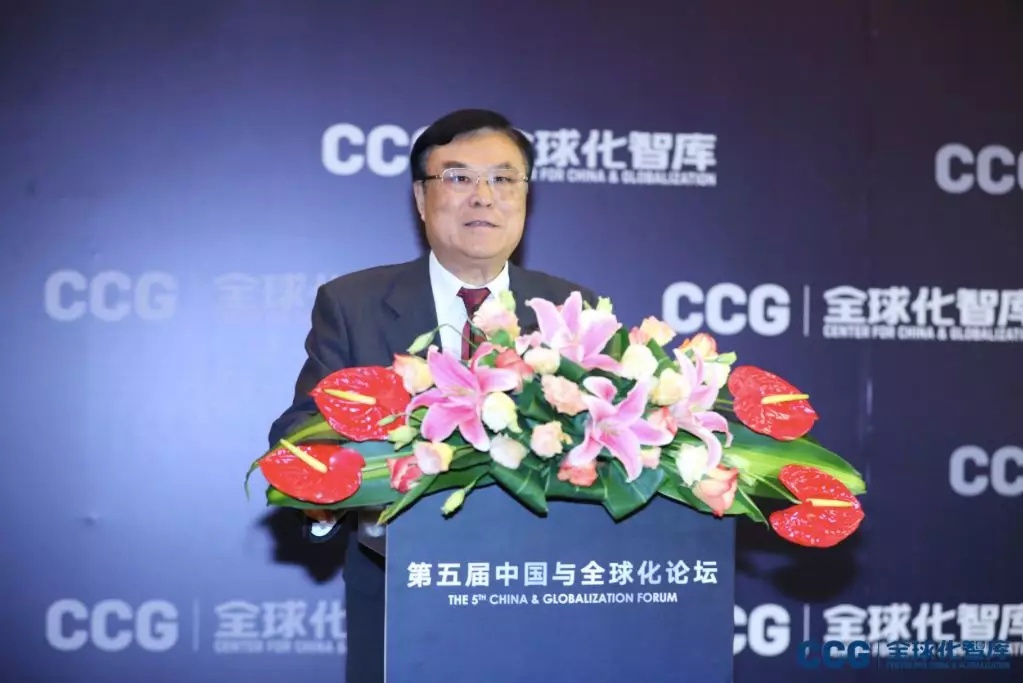
Cui Mingmo, President of MOFCOM China Association for International Economic Cooperation (CAFIEC), spoke of the achievements and economic growth of the People’s Republic of China since its establishment 70 years ago. Mr. Cui said that the upcoming second forum on Belt and Road International Cooperation and the recent passing of the Foreign Investment Law show that China’s open door will not close, but only open wider.

In his speech, H.E. Nicholas Rosellini, UN Resident Coordinator in China, said that globalization had reached a new stage and the world would face more serious challenges. He went on to say that globalization was a double-edged sword. On the one hand, it enhances the links between countries and promotes the development of the world economy. On the other hand, competition among countries is becoming increasingly fierce, with inequality and a widening gap between rich and poor, people have begun to seriously question the impact of globalization.
However, Mr. Rosellini identified that the tide of globalization is unstoppable, and that the solution is neither national protectionism nor conformity. He said that in the new stage of Globalization 4.0, all countries should unite and contribute to solving global problems and safeguarding the common interests of mankind.
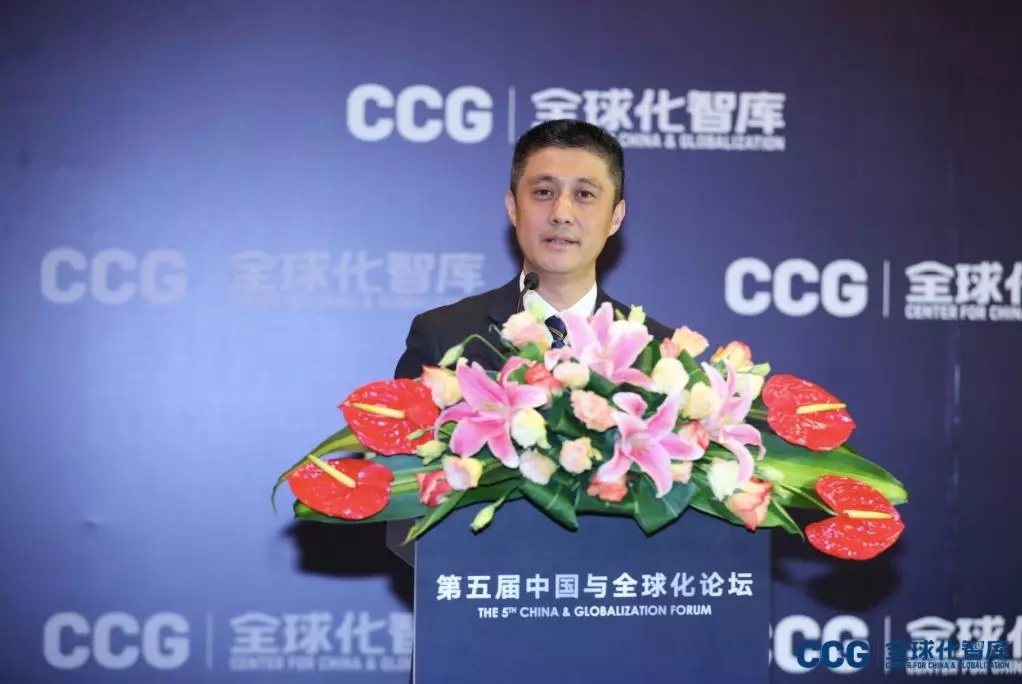
Gao Anming, Vice President of China Foreign Languages Publishing Administration, said that this century will be a crucial period for think tanks and international communication organizations as the world faces unprecedented changes. He commented that leading organizations should look to harness the strategy put forward by Chinese President Xi Jinping at the closing ceremony of the Sino-French Global Governance Forum in Paris last month, to break four key deficits by harnessing the power of change and promoting the establishment of a more just, rational, inclusive and balanced global governance system.
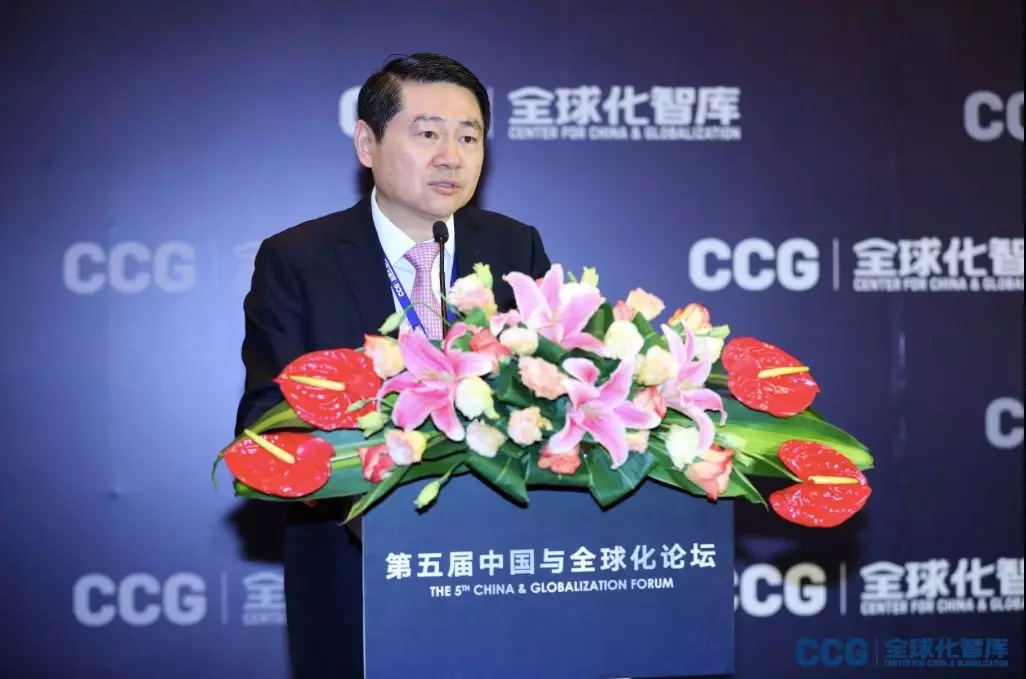
In his welcoming remarks, Wang Huiyao, President of Center for China and Globalization (CCG), Vice President of China Association for International Economic Cooperation (CAFIEC), said that as China moves into a new phase of its Reform and Opening-Up, the world’s perception of China has also entered a new stage. Reviewing the past four China and Globalization Forums, the CCG President noted that discussions with leading figures from diverse backgrounds and unmatched expertise on crucial topics, such as those to be covered in this year’s forum, have critical importance and wide impact.
A Forward-Thinking Forum Examining the Prospects of China and Globalization

In the era of globalization 4.0, China will continue to open-up, actively promote a new phase of globalization, and provide the impetus for open development of the global economy. However, global governance is facing new challenges amidst currents of trade protectionism, unilateralism, trade frictions, and economic turbulence.

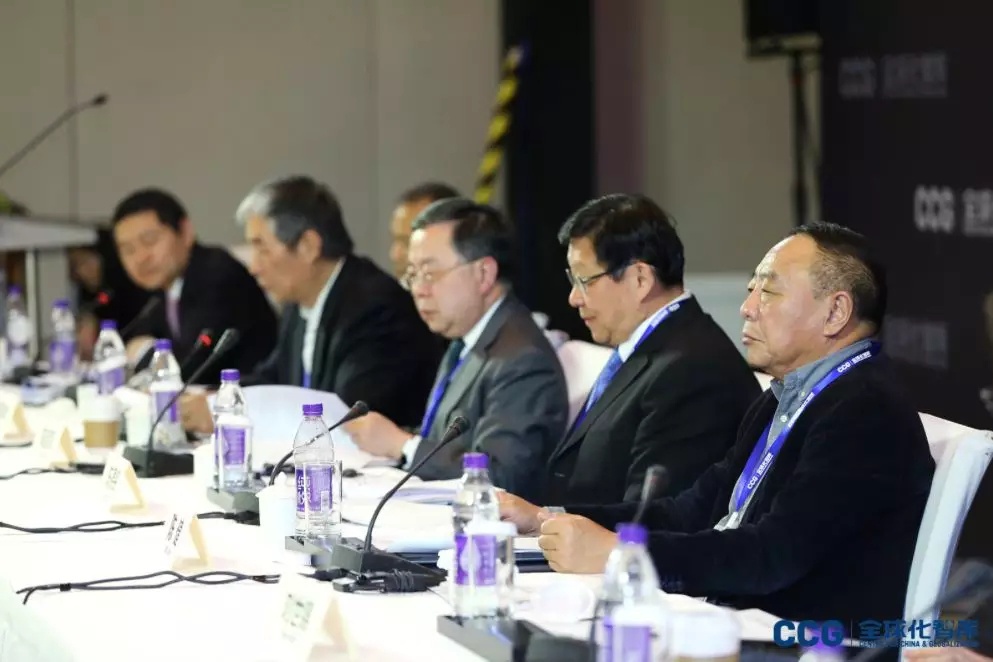
In this context, the Main Session set out to open discussions and share expert and insightful views on the future prospects of globalization and China’s role in the development of globalization. The Main Session, themed “Future Prospects of Opening-Up and Globalization”, gathered together the above mentioned opening speakers as well as many distinguished guest speakers, including Ronnie Chan, Chairman of Hang Lung Properties, CCG Co-Chair; Justin Vaïsse, Director-General of the Paris Peace Forum; Wang Shi, Founder of China Vanke, CCG Senior Vice Chair; and Xue Lan, Dean of Schwarzman College, Tsinghua University, CCG Expert Advisor.
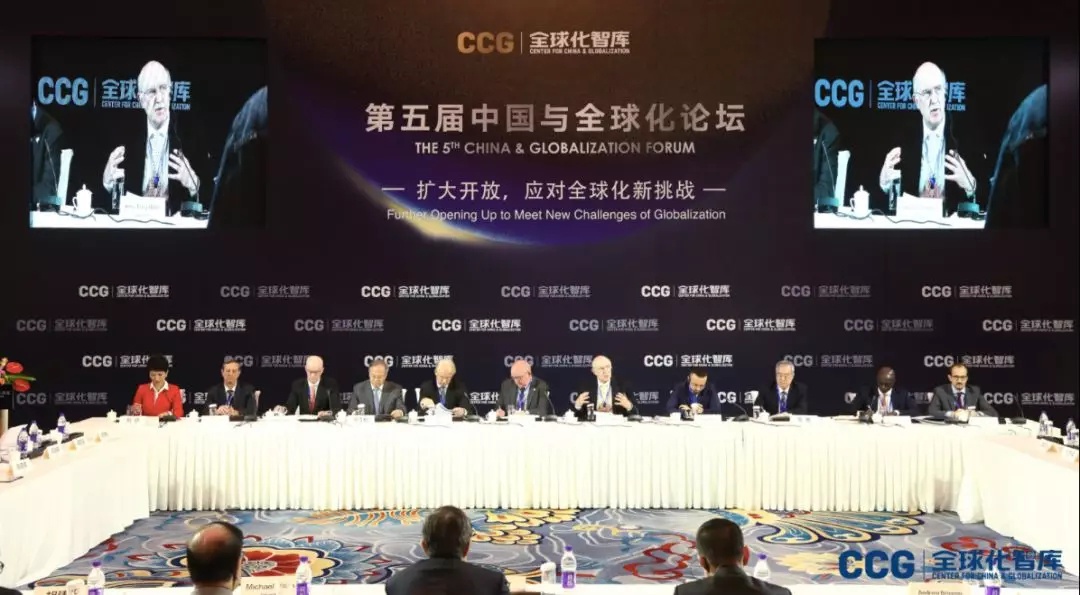


The Belt and Road Initiative (BRI) provides an important framework for deepening international cooperation. Recently, Italy signed an MOU with China, making it the first G7 country to officially support the BRI and Luxembourg followed suit soon after. The Ambassadorial Session, themed “New paths for international cooperation under the Belt and Road Initiative and Beyond”, gathered together a broad range of ambassadors and diplomats from embassies in China, as well as leading Chinese and international representatives, experts and academics to address what can be done to boost international support for the BRI, how the BRI can help support multilateralism and international cooperation, and strengthening third-party cooperation along the initiative.
The Ambassadorial Roundtable, hosted by CGTN Anchor Liu Xin, featured participants including H.E. Edward Boateng, Ambassador of Ghana to China; Giuseppe Crocetti, Chief of Mission, International Organization for Migration (IOM); Giuseppe Fedele, Minister Counselor/Deputy Head of Mission, Italian Embassy Beijing; William Klein, Minister Counselor for Political Affairs, U.S. Embassy Beijing; Hon. Lan Lijun, Director-General of China Foundation for International Studies (CFIS), Former Chinese Ambassador to Indonesia, Canada and Sweden; Hon. Terry Miller, Director of Center for International Trade and Economics, Heritage Foundation, Former US Ambassador to the United Nations; H.E. Eoin O’Leary, Ambassador of Ireland to China; H.E. Miguel Angel Ramirez Ramos, Ambassador of Cuba to China Johannes Regenbrecht, Minister and Deputy Head of Mission, German Embassy Beijing; H.E. Nicholas Rosellini, UN Resident Coordinator in China; and Hon. Su Ge, Chairman of China National Committee for Pacific Economic Cooperation, Former Chinese Ambassador to Iceland, CCG Advisor.

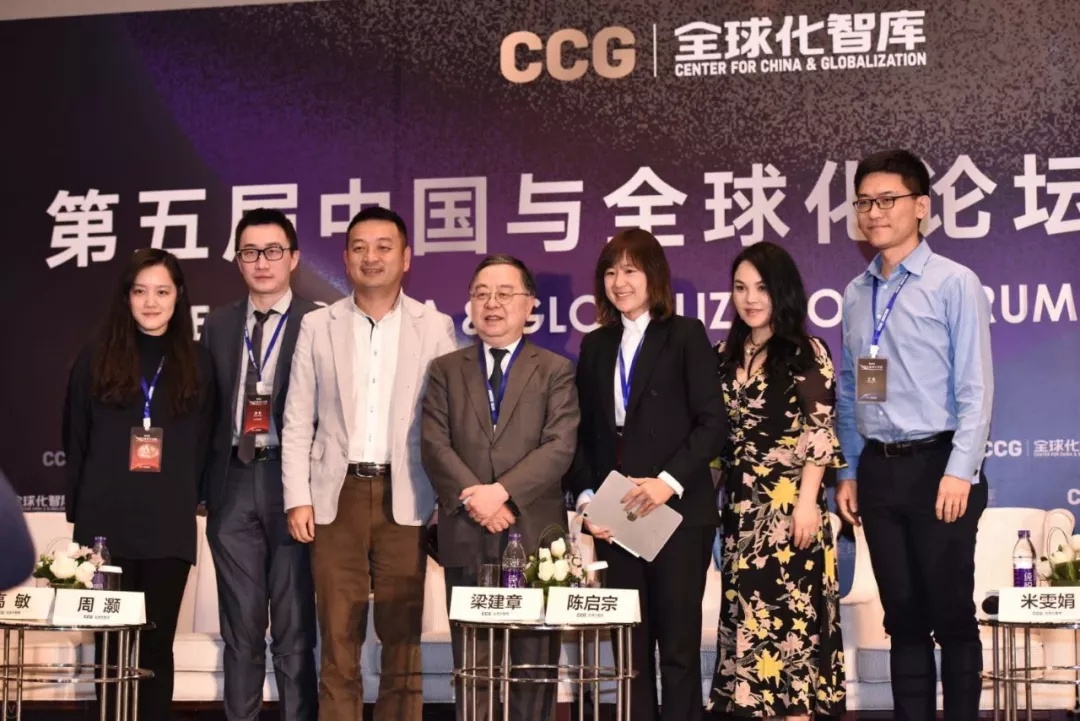
We live in an era of great change and adjustment. A wave of new technologies such as new media, AI and big data are transforming the way we live and work, redefining innovation and intensifying international competition. In the current period of global upheaval, our global governance system faces difficulties in responding effectively to these challenges.
Hosted by Ronnie Chan, Chairman of Hang Lung Properties and CCG Co-Chair, the Luncheon Session took the theme of “Technology and Global Governance: Creating a Shared Future or More Fractured World?” and confronted many big questions facing technology and its impact on global governance. Participants spoke on the use of technologicaladvancements to better humanity and human development, the establishment of a better, rational global governance system that integrates new technologies and some of the issues faced by Chinese and international technology companies.
Speakers at this session included Gao Min, President of Hempel Group, CCG Senior Council Member; Linda He, Chairperson and President of Wailian Overseas Consulting Group; James Liang, Co-founder and Executive Chairman of Ctrip, CCG Senior Vice Chair; Cindy Mi, Founder and CEO of VIPKID, CCG Senior Council Member; Wang Yi, Founder, Chairman and CEO of LAIX; and Zhou Hao, Founder and CEO of Quant Group, CCG Senior Council Member.
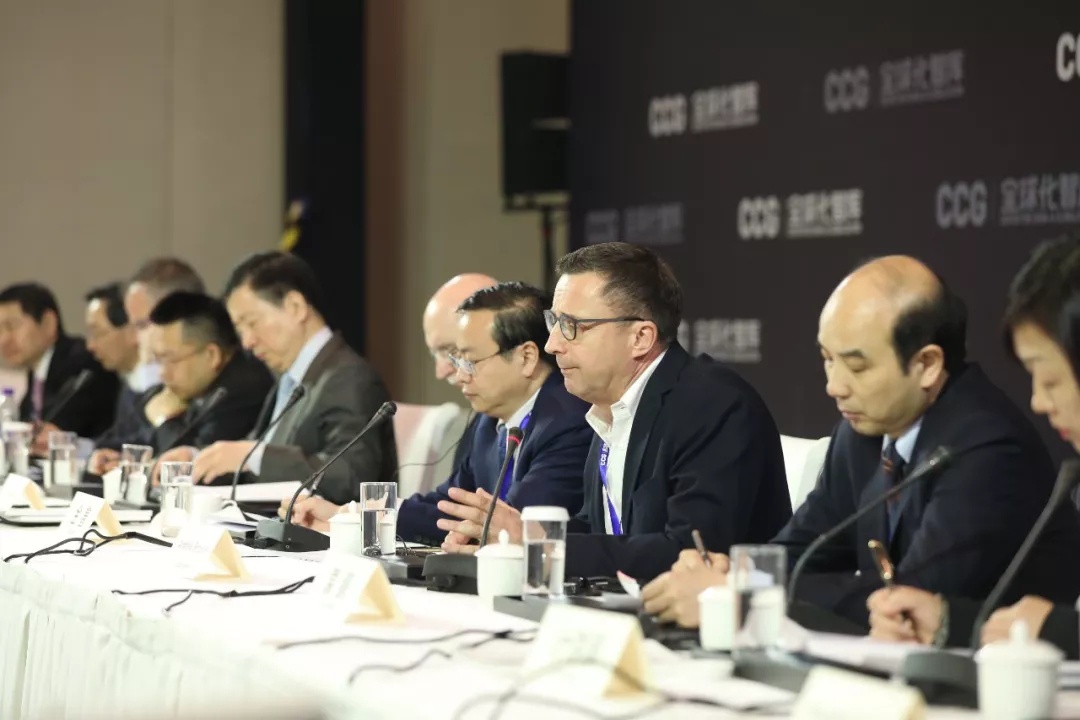
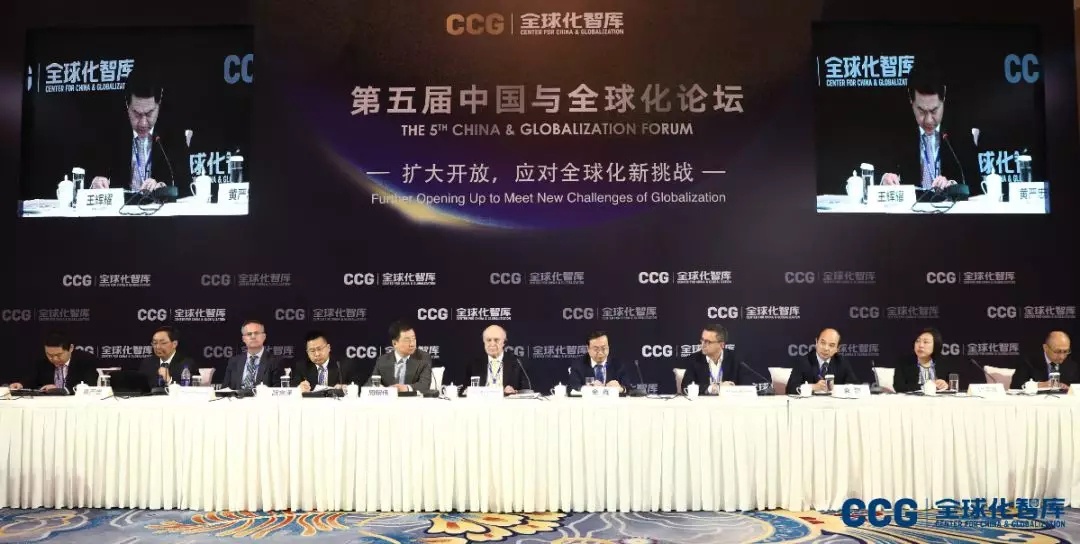
The Sino-US bilateral relationship is one of the world’s most important, with major implications for global strategic stability. Forty years of Sino-US relations have seen steady development and many historic achievements. However, since 2018, with the escalation of trade frictions, relations between the two major powers face unprecedented changes, the term “Thucydides’ Trap” has gained currency in recent years to describe the potential path this critical relationship may take.
The China-US Think Tanks Experts’ Roundtable, hosted by CCG President Wang Huiyao, addressed key questions on the current situation and future prospects of Sino-US relations. Gathering together leading Sino-US relations experts, participants discussed how Thucydides’ Trap can be avoided by working to shape a new model for great power relations, the prospects for interaction between China and the US in Asia and Sino-US trade frictions.
Panelists on this roundtable included Andrew Browne, Editorial Director, Bloomberg New Economy Forum; Huang Yanzhong, Senior Fellow, Council on Foreign Relations; Daniel Ikenson, Director of Herbert A. Stiefel Center for Trade Policy Studies, CATO Institute; Ji Hongbo, Country Representative, The Asia Foundation – China; Jin Xin, Director of China Center for Contemporary World Studies; Masahiro Kawai, Representative Director and Director-General, Economic Research Institute for Northeast Asia; Hon. Terry Miller, Director of Center for International Trade and Economics, Heritage Foundation, Former US Ambassador to the United Nations; Ruan Zongze, Vice President of China Institute of International Studies (CIIS); Yuan Peng, Director, China Institute of Contemporary International Relations (CICIR); and Zhou Mingwei, Former President of China Foreign Languages Publishing Administration, President of Translators Association of China (TAC).
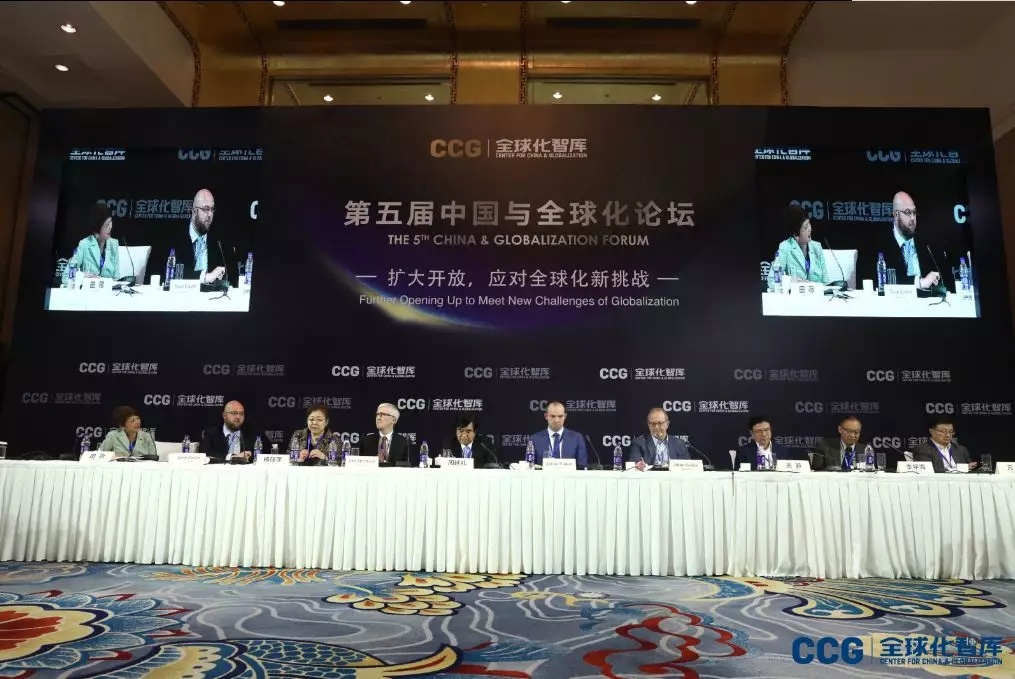
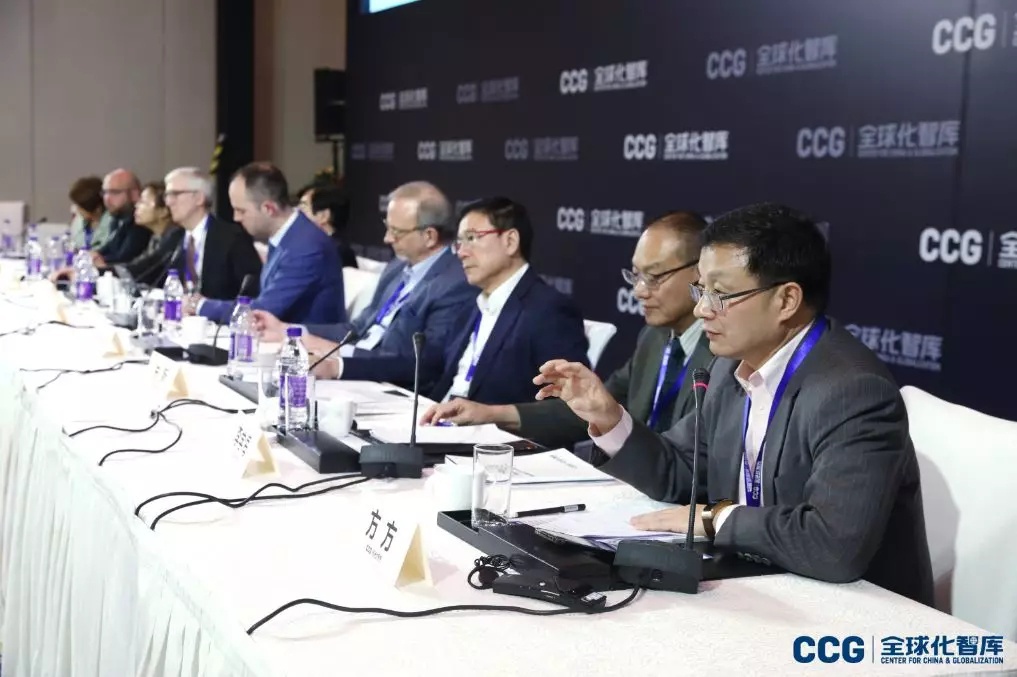
Earlier this year, China’s Foreign Investment Law (FIL) was passed at the second session of the 13th National People’s Congress. The law details new measures that aim to attract and better protect foreign investment in China. The passing of this new law by China’s top legislative body serves as a signal to the world of China’s continued openness to foreign investment.
Tian Wei, CGTN Anchor and CCG Non-Resident Fellow, chaired the China Inbound Roundtable, which took focus on changing global economic circumstances both in China and globally and how these are impacting foreign investment in China. Panelists examined how China can optimize its business environment for foreign investment and the prospects of the Foreign Investment Law.
Prominent CEOs of multinational corporations and leaders from international chambers of commerce joined this discussion, including, Nick Coyle, CEO & Executive Director, AustCham Beijing; Fang Fang, Partner of Waterwood Investment Holdings, CCG Vice Chair; Michael Kuan, Founder and CEO of Kuan Capital, CCG Vice Chair; Allan Gabor, President of Merck China; Howard Li, Chairman and CEO of Waitex Group, Vice Chair, China General Chamber of Commerce-USA, CCG Vice Chair; Jacob Parker, Vice President of China Operations at the U.S.-China Business Council; Tim Stratford, Chairman of AmCham China; Yang Xiaoping, President of BP China; and Zhou Yanli, Former Vice Chair of the China Insurance Regulatory Commission, CCG Advisor.
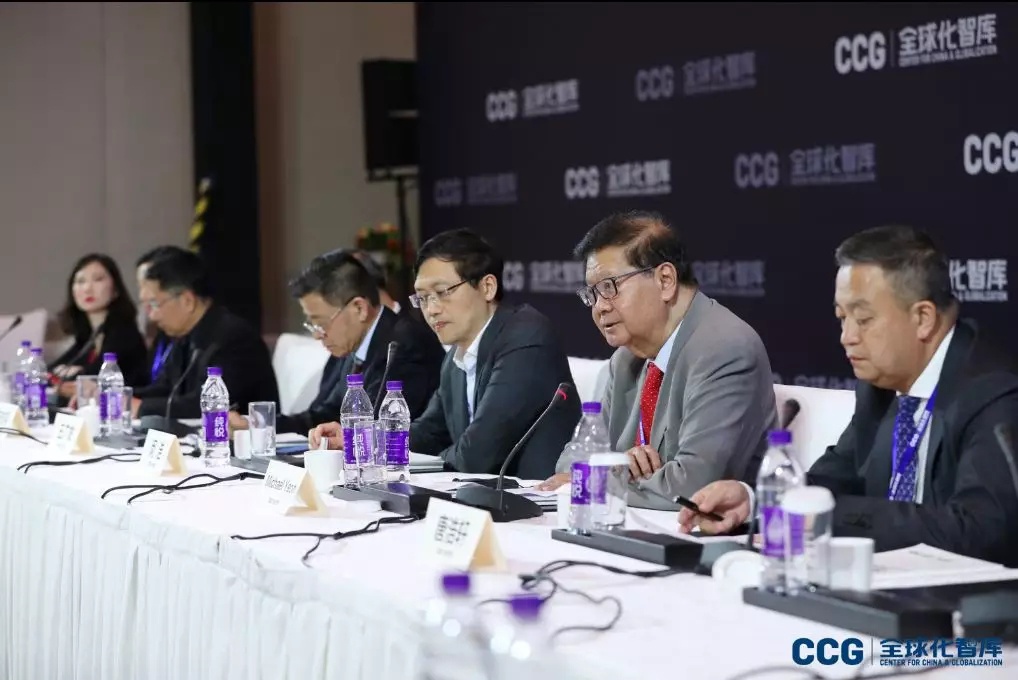
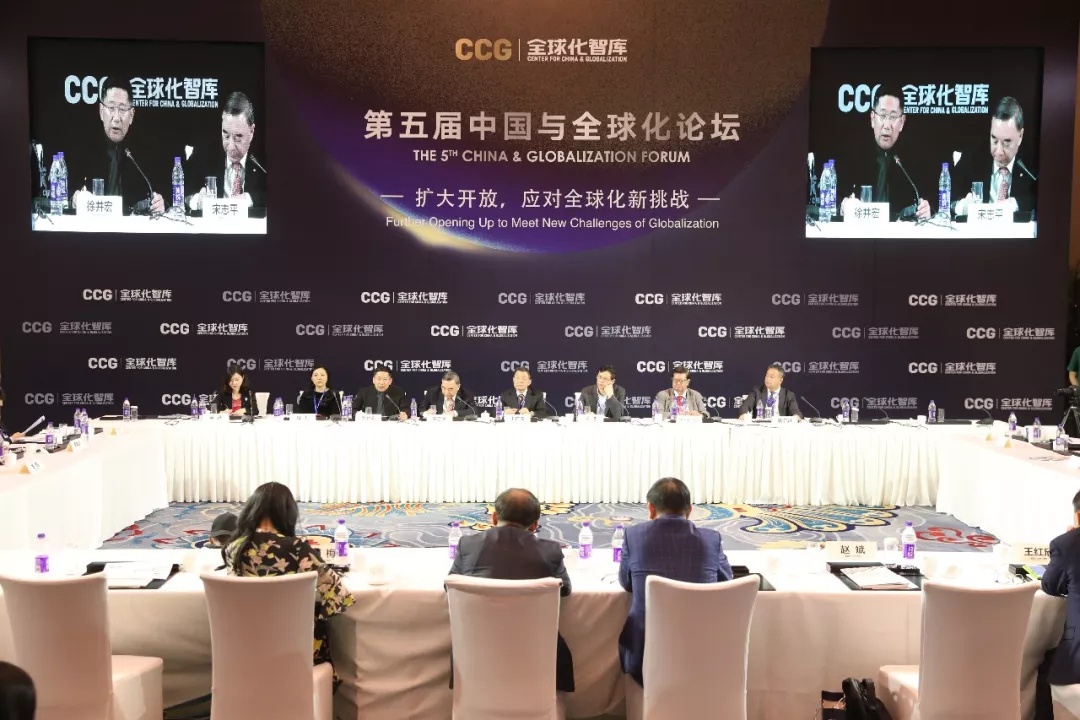
The rise of emerging economies, as is represented by China, has profoundly impacted the future structure of the global economy. Following rapid development at home, increasing numbers of Chinese companies now look overseas for further expansion. Recent data from the Ministry of Commerce shows Chinese outbound direct investmentis following a healthy development trajectory, with increasingly diverse investment and curbing of irrational investment.
Mabel Miao, CCG Vice President and Secretary-General, chaired the “China
Outbound Roundtable: Chinese Outbound Investment in the Changing Context”, to address the new challenges facing outbound investment. Taking aim at how Chinese companies can optimize globalization efforts, strengthen overseas compliance and look to account for and mitigate geopolitical risks, this session featured well-known Chinese business leaders.
Panelists included, Ronnie Chan, Chairman of Hang Lung Properties, CCG Co-Chair; Dan Gao, Chairman and President of Positec Group, CCG Senior Vice Chair; Min Hao, Founder and Chairman of Easthouse Electric, CCG Senior Council Member; Song Zhiping, Chairman of China National Building Materials Group Corporation; Tang Haoxuan, Chairman of Fueta Group, CCG Senior Council Member; Wang Guangfa, Chairman of Beijing Fazheng Group, President of Beijing Royal School, CCG Senior Vice Chair; Wang Linda, Chairperson of Beijing Yihai Properties, CCG Vice Chair; Wei Li, Chief Economist, Hengchang Litong Investment Management; Xu Jinghong, Chairman of Zhong guancun Longmen Investment, Chairman of Asia-America Multi-Technology Association (AAMA), CCG Vice Chair; and Michael Yeoh, President of the Kingsley Strategic Institute and Former CEO of Asian Strategy and Leadership Institute.
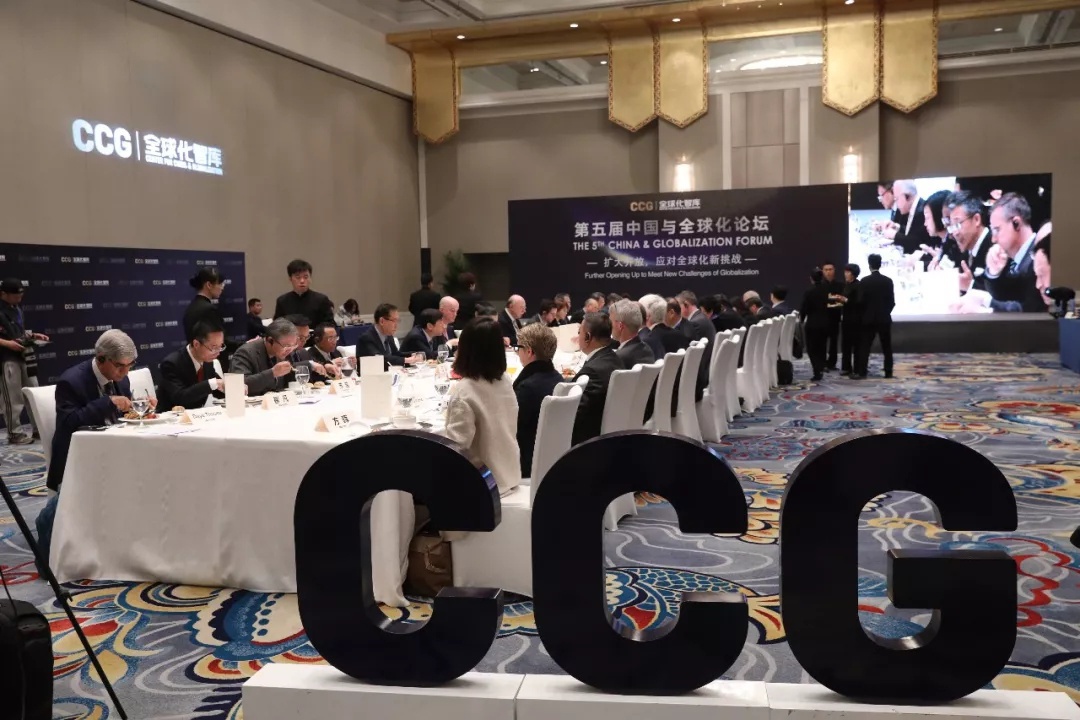

With the rise of protectionism, unilateralism, and populism, our current system of global governance isill-equipped to deal with the challenges of the new era. Yet today, countries are more closely intertwined than ever before.
Addressing key concerns related to these trends, Yang Rui, CGTN Anchor and CCG Non-Resident Fellow, hosted the “Experts’ Evening Session: The Challenges of Global Governance and the Future of Multilateralism”. Taking focus on constructive ways that could be adopted to safeguard and improve multilateralism and the promotion globalization towards win-win cooperation. Panelists explored paths to overcome new challenges facing global governance and share their views on how to tackle what is becoming one of the biggest questions of this century so far.
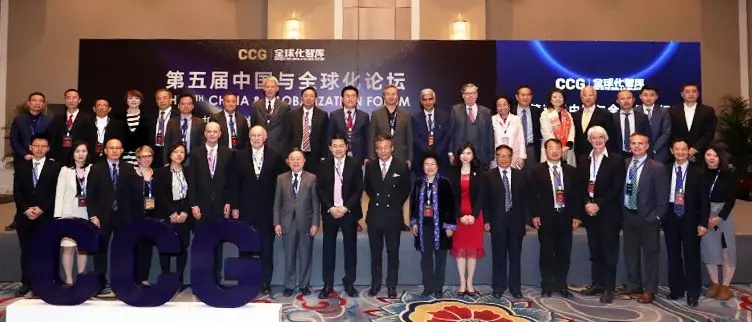
Participants from prominent academic and research institutions in the fields of international relations, international economy and trade, and global governance, as well as distinguished guests who participated in this event include, Amitav Acharya, Distinguished Professor of International Relations of American University, Professor of International Relations at Shwarzman Scholars, Tsinghua University; Laurence Brahm, Founding Director of Himalayan Consensus Institute, CCG Nonresident Senior Fellow; Ronnie Chan, Chairman of Hang Lung Properties, CCG Co-Chair; Chen Wenling, Chief Economist of China Center for International Economic Exchange (CCIEE), CCG Expert Advisor; Cui Fan, Professor at University of International Businessand Economics (UIBE), CCG Nonresident Senior Fellow; He Shenquan, Member of Editorial Board of Global Times; He Weiwen, Former Commercial Counsellor at Chinese Embassy in New York and San Francisco, CCG Senior Fellow; Hou Wenxuan, Chair in Corporate Finance at the Business School, University of Edinburgh, CCG Nonresident Senior Fellow; Huo Jianguo, Former President of the Chinese Academy of International Trade and Economic Cooperation, Ministry of Commerce, CCG Senior Fellow; Daniel Ikenson, Director of Herbert A. Stiefel Center for Trade Policy Studies, CATO Institute; Jiang Shan, Former Director-General of Department of American and Oceanian Affairs of Ministry of Commerce, CCG Senior Fellow; Jin Canrong, Professor and Associate Dean of School of International Studies, Renmin University of China, CCG Expert Advisor; Li Baiqing, Executive Director-General of CGE Peace Development Foundation; Liu Debin, Founding Dean of School of International and Public Affairs, Jilin University, CCG Nonresident Senior Fellow; Su Hao, Director of Center for Strategic and Peace, China Foreign Affairs University, CCG Nonresident Senior Fellow; Sun Jie, Former Director of Department of Asset Management at China Security Regulatory Commission, Former Chairman of Asset Management Association of China, CCG Senior Fellow; Tang Min, Vice Director-General of YouChange Foundation, Counselor for the State Council, PRC, CCG Vice President; Tu Xinquan, Professor and Dean of China Institute for WTO Studies, University of International Business and Economics (UIBE), CCG Nonresident Senior Fellow; Wang Yong,Professor and Director of Center for International Political Economy at Peking University, CCG Nonresident Senior Fellow; and Yu Yunquan, Deputy Director-General of the Academy of Contemporary China and World Studies.

Full list of participantsand speakers (alphabetical order)
Full list of participantsand speakers (alphabetical order)
Alyce Ahn, Officer of Economic Section of U.S. Embassy in Beijing
Anthony Aspden, Political Counselor, Australian Embassy, Beijing
Bai Yunfeng, Senior Manager of External Affairs and Public Policy, DaimlerGreater China
Camille Bortolini,Commerce and Investment Specialist, FrenchEmbassy Beijing
Chang Hongxiao, Senior Research Fellow, Department of Public Affairs, Ctrip
Che Xin, Senior Manager of Curriculum Development, Center for GlobalFinancial Development Education, PBC School of Finance, Tsinghua University
Chen Dingding, Professor of International Relations, Jinan University
Chen Qinghua, Director, Commission of Commerce, Chaoyang District Government,Beijing
Cheng Enjiang, Program Officer, The Ford Foundation
Cheng Jing, Producer and Editor-in-Chief of English Programs, CGTN
Cheng Gang, Venture Partner, ECC Capital; CCG Council Member
Caroline Cheong, Executive Director, Kingsley Strategic Institute
Dusuk Choe, Minister, Embassy of Republic ofKorea Beijing
Larissa Maria LimaCosta, Officerfor Economic Affairs, Brazilian Embassy Beijing
Dai Min, President of America-ChinaPartnership Foundation
Ding Feng, Former Vice President of SamsungGreater China; CCG Senior Council Member
Ding Jie, Fellow, Academy of Contemporary China and the World Studies(ACCWS)
Dong Ruiping, Vice President for Public Affairs, Herballife
Dong Zengjun, CEO of CST Biological Reagents Company Asia Pacific and General
Manager of CST China; CCG Senior Council Member
Duan Suhan, Managing Partner of Shenzhen Share Capital; CCG Senior CouncilMember
Evan Due, Senior Advisor for China Development Research Foundation(CDRF)
Adam Dunnet, Secretary-General, EU Chamber of Commerce in China
Deanna Easton, Counselor of Commerce,Australian Embassy Beijing
Fan Lingzhi, Chief Reporter, Global Times
Fang Hui, Program Officer, Asia Foundation Beijing
Feng Xuemei, Head of China Youth Opinion
Fu Chenggang, Chief Representative in China, Abu Dhabi Global Market
Francesco Floris, Chief Trade Counselor, EU Delegation to China
Adam Fields, Political Officer, U.S. Embassy Beijing
Gao Yanding, CEO and Founder, Yanding US-China; CCG Senior Council Member
Gao Zhenhuai, Vice Chair, Shenzhen Policy Advisory Committee; FormerSecretary-General of Shenzhen Municipal Government
Guan Depeng, Deputy Director, Commission of Commercial Affairs, ChaoyangDistrict Government, Beijing
Fu Jun, Director of Public Affairs, Hop Hing Holdings
